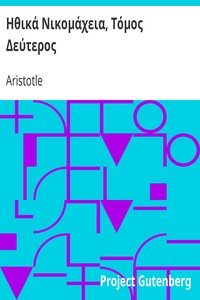Ηθικά Νικομάχεια, Τόμος Δεύτερος by Aristotle
"Ηθικά Νικομάχεια, Τόμος Δεύτερος" by Aristotle is a philosophical work from ancient Greece. This treatise explores the science of the good for human life—examining how people should best live and what actions should aim toward. Aristotle approaches ethics as practical rather than merely theoretical, seeking to help readers achieve goodness. The work profoundly influenced medieval European philosophy, law, and theology, and later inspired the modern virtue ethics movement. (This is an automatically
generated summary.)
Read or download for free
| How to read | Url | Size | |||
|---|---|---|---|---|---|
| Read now! | https://www.gutenberg.org/ebooks/29011.html.images | 404 kB | |||
| EPUB3 (E-readers incl. Send-to-Kindle) | https://www.gutenberg.org/ebooks/29011.epub3.images | 179 kB | |||
| EPUB (older E-readers) | https://www.gutenberg.org/ebooks/29011.epub.images | 182 kB | |||
| EPUB (no images, older E-readers) | https://www.gutenberg.org/ebooks/29011.epub.noimages | 163 kB | |||
| Kindle | https://www.gutenberg.org/ebooks/29011.kf8.images | 418 kB | |||
| older Kindles | https://www.gutenberg.org/ebooks/29011.kindle.images | 402 kB | |||
| Plain Text UTF-8 | https://www.gutenberg.org/ebooks/29011.txt.utf-8 | 387 kB | |||
| Download HTML (zip) | https://www.gutenberg.org/cache/epub/29011/pg29011-h.zip | 175 kB | |||
| There may be more files related to this item. | |||||
About this eBook
| Author | Aristotle, 385 BCE-323 BCE |
|---|---|
| Translator | Zambas, Kyriakos, 1866- |
| Title | Ηθικά Νικομάχεια, Τόμος Δεύτερος |
| Alternate Title | Nicomachean Ethics, Volume 2 |
| Note | Wikipedia page about this book: en.wikipedia.org/wiki/Nicomachean_Ethics Wikipedia page about this book: el.wikipedia.org/wiki/%CE%97%CE%B8%CE%B9%CE%BA%CE%AC_%CE%9D%CE%B9%CE%BA%CE%BF%CE%BC%CE%AC%CF%87%CE%B5%CE%B9%CE%B1 |
| Credits | Produced by Sophia Canoni. Book provided by Iason Konstantinidis |
| Language | Greek |
| LoC Class | B: Philosophy, Psychology, Religion |
| Subject | Ethics |
| Category | Text |
| EBook-No. | 29011 |
| Release Date | May 31, 2009 |
| Most Recently Updated | Nov 29, 2009 |
| Copyright Status | Public domain in the USA. |
| Downloads | 203 downloads in the last 30 days. |
| Project Gutenberg eBooks are always free! | |

